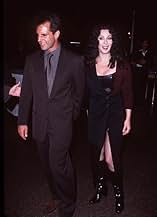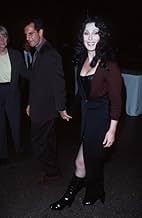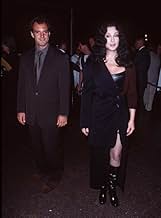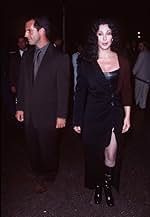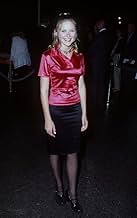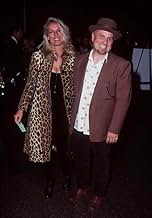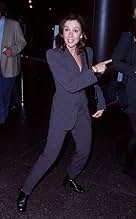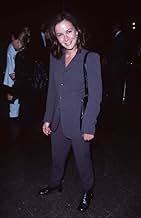IMDb RATING
6.9/10
5.4K
YOUR RATING
The movie examines the abortion issue through three stories set in different eras: 1952, 1974 and 1996.The movie examines the abortion issue through three stories set in different eras: 1952, 1974 and 1996.The movie examines the abortion issue through three stories set in different eras: 1952, 1974 and 1996.
- Nominated for 4 Primetime Emmys
- 4 wins & 15 nominations total
Bob Shuttleworth
- Hospital Visitor (segment "1952")
- (as Bob Shuttlesworth)
Featured reviews
All three of these short films are good, but the first is outstanding, largely because Demi Moore, whose performances I've otherwise never particularly liked, is so excellent. The point that she and Savoca convey - powerfully - is the sheer isolation, 50 years ago, of women who faced unwanted pregnancies. Moore spends most of the film, it seems, sitting alone in an empty house. Otherwise, she's enduring the company of her late husband's family, who see her only as their boy's widow, not as a human being. It's a frightening story that exerts a very strong empathetic pull.
The dialog is spare; Savoca relies on Moore's face and body language to convey her terror, aloneness and feeling that things are closing in on her. There's very little "emoting" here, which makes Moore's character all the more forceful. The result is an exemplary piece of film acting.
Of course, how much do we need in the way of tears and histrionics when we can see Moore attempting the old knitting needle cure, and later dealing with the aftereffects of a ghastly kitchen-table operation? This country's abortion laws created - and maintain effectively, in many places - a sort of hell for pregnant women. Thanks to this film, we can really understand a bit of what it was - and is - like.
The dialog is spare; Savoca relies on Moore's face and body language to convey her terror, aloneness and feeling that things are closing in on her. There's very little "emoting" here, which makes Moore's character all the more forceful. The result is an exemplary piece of film acting.
Of course, how much do we need in the way of tears and histrionics when we can see Moore attempting the old knitting needle cure, and later dealing with the aftereffects of a ghastly kitchen-table operation? This country's abortion laws created - and maintain effectively, in many places - a sort of hell for pregnant women. Thanks to this film, we can really understand a bit of what it was - and is - like.
This film shows up as well now as I did when I first saw it in 1996 and was amazed. All those in the "demi moore can't act" camp should check out what she can do with the right material. She delivers an amazing performance in the first piece, giving those of us who dont remember a glimpse of the pre-Roe v Wade situation for women who found themselves in a less than desirable situation. Sissy Spacek is brilliant as ever in a lighter, though heartfelt and often ignored situation of a mom deciding whether one more child is what she wants. The final segment knocks me off my feet. Kudos to Cher for pulling together great actors and great stories.
I love this film because it tackles the issue from both internal and external places. Arguments are presented without bias, no matter what some may say. My dad even thought this was a Pro-Life film. I clearly disagree with him and believe it's got lots of Pro-Choice leanings. Demi Moore playing a nurse who is totally alone with an unplanned pregnancy was excellent. Her fear and aloneness in the not so fabulous '50s was so beautifully represented. And it's like the other comment said, her "family" treated her more like an extension of their dead son than like an individual person. I'd rather have no family at all than one like that. Sissy Spacek represented a choice, in a decade where choices were allowed. She had it so much easier than Demi Moore's character, yet her struggle and ultimate decision were just as hard in a lot of ways, maybe even harder. Anne Heche and Cher play two women who are up against Pro-Lifers who "love babies". It reminds me of a bumper sticker I once saw: "I love babies...born and unborn." Okay, great, but too many people who love babies actually hate KIDS. Once the child is no longer bald, pink and small, this passionate "love" turns into hatred and abuse of the worst kind. I know, I've seen it and I've lived it. Truly the most nerve jangling moment is at the very end of the film. Matthew Lillard is terrific as a psycho!!!
I give this film an A+++++
I give this film an A+++++
I have just seen 'If These Walls Could Talk' for the first time, and I am completely in awe. This film should be mandatory viewing material for any person who thinks that abortion is an easy choice or that women faced with an unplanned pregnancy should have their right to choose taken away from them.
Sissy Spacek did a wonderful job portraying the most overlooked unplanned pregnancy demographic: the aging career mother who must choose whether or not to make the sacrifice of raising another child. In this story I truly appreciated the message that choosing to have a child is also pro-choice. Anne Heche's role in the final story was the most 'typical' of the three: the single college student who must struggle with her own moral and personal issues when making a choice about her pregnancy. While she portrayed the most common demographic of women who face an unplanned pregnancy, her role was beautifully and honestly acted. But the most riveting and heartbreaking of the three stories featured Demi Moore as a young widow who must make the hardest decision in her life-- to risk not only her career and reputation but the relationship of her in-laws who have taken her in as one of their own by carrying to term the baby of her dead husband's brother, or to risk her life by choosing what was once a barbaric and incredibly dangerous procedure due to the illegality of abortion. Her struggle is disturbing, and any woman who remembers the dark days before Roe v. Wade will feel her character's pain, fear, and especially her desperation. This story in particular showcases why keeping abortion safe and legal is so very necessary.
What struck me most about this film was not only the realism in all three situations, but how each one of the stories showed that "Pro-Choice" is not always "Pro-Abortion"; a fact that those of us who support a woman's right to chose will be all too glad to point out while those of the stauncher anti-choice fold may be a little slow to admit. The struggle that each woman faces in this film is unique, and while another reviewer mistakenly commented that each instance was merely 'cliché', I will argue that each instance was REAL. Rape and incest are not the causes for most unplanned pregnancies, and a great number of women who choose abortion are of legal age to do so. This film would have been 'cliché' if every actor had portrayed a low-income person of color, which is clearly unrealistic. And while violence against abortion providers isn't an every day occurrence, there are people in our society who wish that were the case-- and including this scene in the film shows us, in graphic detail, the hypocrisy of that opinion.
I was surprised that this film, especially the final story, didn't tackle other reproductive choice-related issues such as birth control. However, I was extremely pleased with how the final story educated viewers on the realities of the abortion procedure (mandatory counseling and all)-- a reality which couldn't be further from the horrific depictions offered up by many in the anti-choice camp. Speaking of which: I was grateful for this film showing that not all people who oppose abortion are stereotypical, out of control lunatics, but that the most radical in this faction tend to be, ironically, male. And one comment made by a character regarding adoption truly hit home for me as I once worked in a residential facility for abandoned and abused children that was, like so many others in this country, bursting at the seams: "The last time I checked, there wasn't a shortage of little black babies".
This film needs to be aired during prime time and piped into the Bush White House, if for no other reason than to show that abortion is not a black and white issue, that the argument surrounding it cannot be settled through protest, violence or prohibition, and that restricting a woman's legal right to reproductive choice will only complicate matters further but will not be an end to abortion. Anyone who has ever been faced with an unplanned pregnancy will agree, and anyone who hasn't will learn that their opinion can be subject to change depending on their circumstances.
Sissy Spacek did a wonderful job portraying the most overlooked unplanned pregnancy demographic: the aging career mother who must choose whether or not to make the sacrifice of raising another child. In this story I truly appreciated the message that choosing to have a child is also pro-choice. Anne Heche's role in the final story was the most 'typical' of the three: the single college student who must struggle with her own moral and personal issues when making a choice about her pregnancy. While she portrayed the most common demographic of women who face an unplanned pregnancy, her role was beautifully and honestly acted. But the most riveting and heartbreaking of the three stories featured Demi Moore as a young widow who must make the hardest decision in her life-- to risk not only her career and reputation but the relationship of her in-laws who have taken her in as one of their own by carrying to term the baby of her dead husband's brother, or to risk her life by choosing what was once a barbaric and incredibly dangerous procedure due to the illegality of abortion. Her struggle is disturbing, and any woman who remembers the dark days before Roe v. Wade will feel her character's pain, fear, and especially her desperation. This story in particular showcases why keeping abortion safe and legal is so very necessary.
What struck me most about this film was not only the realism in all three situations, but how each one of the stories showed that "Pro-Choice" is not always "Pro-Abortion"; a fact that those of us who support a woman's right to chose will be all too glad to point out while those of the stauncher anti-choice fold may be a little slow to admit. The struggle that each woman faces in this film is unique, and while another reviewer mistakenly commented that each instance was merely 'cliché', I will argue that each instance was REAL. Rape and incest are not the causes for most unplanned pregnancies, and a great number of women who choose abortion are of legal age to do so. This film would have been 'cliché' if every actor had portrayed a low-income person of color, which is clearly unrealistic. And while violence against abortion providers isn't an every day occurrence, there are people in our society who wish that were the case-- and including this scene in the film shows us, in graphic detail, the hypocrisy of that opinion.
I was surprised that this film, especially the final story, didn't tackle other reproductive choice-related issues such as birth control. However, I was extremely pleased with how the final story educated viewers on the realities of the abortion procedure (mandatory counseling and all)-- a reality which couldn't be further from the horrific depictions offered up by many in the anti-choice camp. Speaking of which: I was grateful for this film showing that not all people who oppose abortion are stereotypical, out of control lunatics, but that the most radical in this faction tend to be, ironically, male. And one comment made by a character regarding adoption truly hit home for me as I once worked in a residential facility for abandoned and abused children that was, like so many others in this country, bursting at the seams: "The last time I checked, there wasn't a shortage of little black babies".
This film needs to be aired during prime time and piped into the Bush White House, if for no other reason than to show that abortion is not a black and white issue, that the argument surrounding it cannot be settled through protest, violence or prohibition, and that restricting a woman's legal right to reproductive choice will only complicate matters further but will not be an end to abortion. Anyone who has ever been faced with an unplanned pregnancy will agree, and anyone who hasn't will learn that their opinion can be subject to change depending on their circumstances.
If you ever thought a woman's right to choose was an easy one, this will take care of that. Unexpected pregnancy can be from carelessness of course, but it can also be from fallible birth control, boyfriends who lie, and people you were with against your will. This is three distinct movies in one on the same topic of a woman trying to chose to have, or not have, an unexpected baby. Each one is set in a different decade.
I had to turn the volume down and close my eyes at times. Not for gruesomeness but the way you close your eyes when someone is about to hit that awful note in the Star Spangled Banner. You feel the pain of their attempt at something difficult. You don't just watch this movie, you feel it.
Men are not portrayed as multi-dimentional as the women are, but they are not the villian either. They are included yet they can never fully understand. You see the suffering the women go through in their own head, how difficult it is, the wavering in their decisions. They have equal fear of having an abortion, having a baby, and having the people around them know of their predicament.
I had to turn the volume down and close my eyes at times. Not for gruesomeness but the way you close your eyes when someone is about to hit that awful note in the Star Spangled Banner. You feel the pain of their attempt at something difficult. You don't just watch this movie, you feel it.
Men are not portrayed as multi-dimentional as the women are, but they are not the villian either. They are included yet they can never fully understand. You see the suffering the women go through in their own head, how difficult it is, the wavering in their decisions. They have equal fear of having an abortion, having a baby, and having the people around them know of their predicament.
Did you know
- TriviaHolds the record as HBO's highest-rated original movie.
- GoofsIn the 1974 segment, one of the kids mentions wanting to watch The Partridge Family (1970), which at that time, aired on Saturday night. However, the kids had been to school that day so it was not a Saturday.
- Quotes
Patti (segment "1996"): You get this abortion and I swear to you, you are on your own.
- Alternate versionsThe UK video version was cut by 3 secs to reduce multiple gunshots during the hospital shooting scene.
- SoundtracksCrazy
Written and Performed by Seal
Details
- Release date
- Country of origin
- Language
- Also known as
- Mitt liv, mitt val
- Production companies
- See more company credits at IMDbPro
- Runtime
- 1h 37m(97 min)
- Color
- Sound mix
- Aspect ratio
- 1.33 : 1
Contribute to this page
Suggest an edit or add missing content

